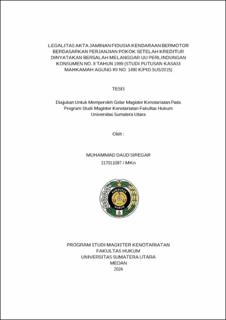| dc.contributor.advisor | Kamello, Tan | |
| dc.contributor.advisor | Agustining | |
| dc.contributor.advisor | Mulyadi, Mahmud | |
| dc.contributor.author | Siregar, Muhammad Daud | |
| dc.date.accessioned | 2024-10-29T06:52:25Z | |
| dc.date.available | 2024-10-29T06:52:25Z | |
| dc.date.issued | 2024 | |
| dc.identifier.uri | https://repositori.usu.ac.id/handle/123456789/98426 | |
| dc.description.abstract | Supreme Court Cassation Decision No. 1490 K/Pid.Sus/2015 dated March 17, 2016 ruled that the defendanu (business operator) was found guilty of violating the First Alternative Charge (violation of the Fiduciary Law) and sentenced the defendant (business operator) to 6 (six) months of imprisonment. Based on this, this research aims to examine the procedure for creating a fiduciary deed as an accessory agreement, the validity of fiduciary deeds made beyond the timeframe stipulated in Law No. 42 of 1999 concerning Fiduciary, and the juridical analysis of Supreme Court Cassation Decision No. 1490 K/Pid. Sus/2015 dated March 17, 2016
The research method used in this study is a normative juridical research, which is descriptive-analytical Data analysis in this research utilizes qualitative methods. The data sources in this study are secondary data obtained through literature review. Data collection techniques include document study, and data analysis is conducted qualitatively using deductive reasoning.
The results of the research indicate that the maximum period allowed for electronic registration of fiduciary security interests is 30 (thirty) days from the date of the fiduciary deed creation. Agreements to execute the fiduciary collateral by means contrary to Law No. 42 of 1999 concerning Fiduciary are declared null and void under the law; therefore, fiduciary deeds not registered within 30 (thirty) days cannot serve as the basis for execution of security if the debtor defaults. In this regard, the researcher agrees with the court's decision to convict the defendant for violating consumer protection laws due to the inclusion of standard clauses in motor vehicle financing agreements by PT. Sinar Mitra Sepadan Finance Langsa Branch represented by the defendant ZULKARNAIN BIN ABDULLAH as the creditor and business operator leasing company, which clearly do not comply with consumer protection regulations. Consumers often find themselves "trapped" by standard clauses in financing agreements that favor business operators, especially when consumers are in need. | en_US |
| dc.language.iso | id | en_US |
| dc.publisher | Universitas Sumatera Utara | en_US |
| dc.subject | Fiduciary | en_US |
| dc.subject | PT SMS Langsa | en_US |
| dc.subject | Consumer Protection | en_US |
| dc.title | Legalitas Akta Jaminan Fidusia Kendaraan Bermotor Berdasarkan Perjanjian Pokok Setelah Kreditur Dinyatakan Bersalah Melanggar UU Perlindungan Konsumen No. 8 Tahun 1999 (Studi Putusan Kasasi Mahkamah Agung RI No. 1490 K/Pid.Sus/2015) | en_US |
| dc.title.alternative | Legality of Motor Vehicle Fiduciary Guarantee Deed Based on Principal Agreement After Creditor is Found Guilty of Violating Consumer Protection Law No. 8 of 1999 (Study of Supreme Court Cassation Decision No. 1490 K/Pid.Sus/2015) | en_US |
| dc.type | Thesis | en_US |
| dc.identifier.nim | NIM217011097 | |
| dc.identifier.nidn | NIDN0021046206 | |
| dc.identifier.nidn | NIDN0001047403 | |
| dc.identifier.kodeprodi | KODEPRODI74102#Kenotariatan | |
| dc.description.pages | 154 Pages | en_US |
| dc.description.type | Tesis Magister | en_US |
| dc.subject.sdgs | SDGs 16. Peace, Justice And Strong Institutions | en_US |


